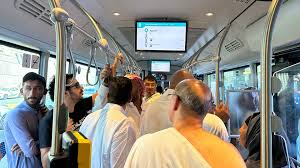
In the heart of the Indian Ocean, the island nation of Mauritius is renowned for its stunning beaches, diverse culture, and robust economy. However, one aspect that often goes unnoticed is its public transport system. This article aims to delve into the question: how far is public transport reliable and affordable in Mauritius?
Reliability of Public Transport in Mauritius
The backbone of Mauritius’ public transport system is its bus network. Operated by several companies, including the National Transport Corporation (NTC), United Bus Service (UBS), and Triolet Bus Service (TBS), the buses cover almost every corner of the island. The Mauritius Metro Express, a light rail transit system, is another significant addition to the public transport infrastructure, connecting the capital city of Port Louis to other major towns.
The reliability of public transport in Mauritius is generally commendable. Buses run from early morning until late evening, with an average frequency of 15-20 minutes during peak hours. The Metro Express operates with a similar schedule and frequency. However, it’s worth noting that there can be occasional delays due to traffic congestion, particularly in urban areas during rush hours.
Affordability of Public Transport in Mauritius
When it comes to affordability, public transport in Mauritius is quite economical. The average bus fare ranges from MUR 15 to MUR 35, depending on the distance traveled. The Metro Express offers a flat rate of MUR 30 for a single trip, regardless of the distance. Moreover, students, senior citizens, and people with disabilities are eligible for free or discounted fares, making public transport even more affordable for these groups.
However, it’s important to note that while these fares are relatively low compared to private transport options, they may still pose a burden for low-income households. The government has implemented several measures to address this issue, such as the introduction of the Social Register of Mauritius (SRM), which provides free travel to families living in absolute poverty.
Conclusion
In conclusion, the public transport system in Mauritius is generally reliable and affordable. However, there is always room for improvement. The government and transport operators should continue to invest in infrastructure, technology, and services to enhance the reliability and affordability of public transport. This will not only benefit the residents but also contribute to the sustainable development of the country.

